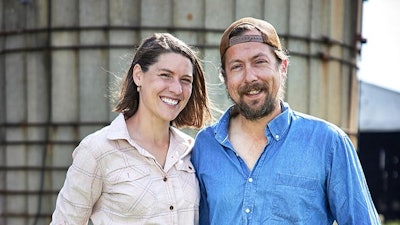
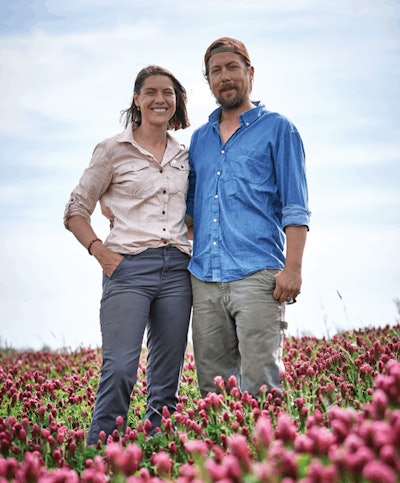
Visit Tulip Tree Gardens in Beecher, Ill., and you’ll get a glimpse into family farm life. But not much about this 63-acre farm 40 miles south of Chicago is conventional. The future of the land and its idle buildings shifted dramatically in 2019 when it became home to Rachael and Jesse Smedberg and their young twins. Hemp, heirloom vegetables, and regenerative agriculture now coexist where sharecropped corn and soybean fields once grew.
Rachael Smedberg founded Tulip Tree Gardens (TTG) in 2015 as a three-quarter-acre microfarm in the town of Crete, just north of Beecher. Her husband, Jesse Smedberg, worked in industrial engineering and project management, while she was a stay-at-home mom with a background in social work. They saw a need for organic food in the area, so Rachael set about building the TTG brand and selling the microfarm’s organic produce at local farmers markets.
Through the microfarm, TTG established a strong brand foundation. The couple became passionate about farming and soil health. Then, the passage of the Agriculture Improvement Act of 2018 (2018 Farm Bill) opened the way to a bigger dream. “We saw an opportunity to become farmers full-time and really create the family farm again,” Rachael explains.
So, they bought the Beecher farm, became first-generation farmers, and developed a plan to restore the farm’s soil along with its buildings. Hemp provided an avenue for both regeneration and profitability.
Fueling Farm Life Through Hemp
With regenerative goals, the Smedbergs established a small yet vertically integrated hemp business that both produces its own hemp products and works with other farmers on their brands.
The Smedbergs say hemp-related products and services account for more than 80% of TTG’s annual revenue. Unlike many small hemp and CBD businesses, the Smedbergs not only grow but also process their own industrial hemp. Jesse built an on-site extraction lab, drawing on his expertise with heavy machinery engineering.
“It was fairly easy to wrap my hands around the machinery, and then the principles of extraction and distillation were pretty straightforward from there,” he says.
For 2021, they’re planting about 20,000 plants from seeded starts and clones for CBD (cannabidiol), CBG (cannabigerol) and CBDV (cannabidivarin). That number is down from previous years’ 100,000-plus as part of an ongoing “less is more” mindset that includes continually refining products and services, streamlining labor and maximizing profitability of the farm.
After losing 100,000 plants to spring rains in 2019, TTG diversified planting dates and locations. About 5,000 of this year’s starts will be at their home farm, with the balance distributed over three off-site fields owned by contracted growers to minimize risk. These growers help supply the company’s wholesale inventory.
This year’s crop is all triploid genetics, which are bred to be sterile and therefore not at risk of cross-pollination. “That’s the hope,” Jesse says.
In addition, TTG is growing its first hemp crop for fiber this year. The direct-sown, 10-acre crop will act as a cover crop to help regenerate the soil in which it grows. After harvest, the Smedbergs will produce hempcrete blocks to build livestock barns as part of the regeneration of the farm’s buildings. This is especially advantageous considering soaring lumber prices this year, which are up 300% since April 2020, according to the National Association of Home Builders.
TTG-branded hemp-derived products range from full-spectrum CBD oils to smokable hemp flower. Rachael and Jesse create their formulations and branded products on-site at the farm. The focus is on whole-plant wellness and natural ingredients, not just CBD.
One example is their full-spectrum CBD oil, which incorporates cold-processed unrefined hempseed oil, full-spectrum CBD distillate, and hemp and botanical terpenes. “What’s nice about that is it’s nutritional. You get your omega-3, -6 and -9 and your essential amino acids, and you’re getting the CBD and then the terpenes,” Rachael says.
The farm also partners with an off-site greenhouse partner to produce premium smokable hemp flower, which allows them to offer both outdoor and greenhouse-grown hemp. TTG handles consulting, drying, curing and packaging for the greenhouse.
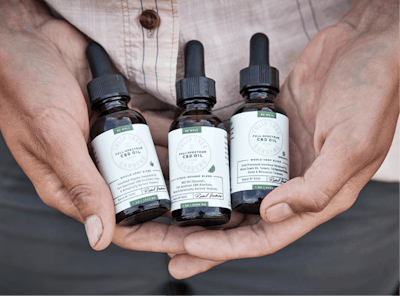
Providing Turnkey B2B Hemp Services
As Tulip Tree Gardens has grown, so have the company’s business-to-business (B2B) offerings. TTG provides many services to other hemp producers, from consulting and extraction to private labeling and branding.
“We offer turnkey solutions for other brands. We serve small- to medium-size brands in our local area. We make their products and do a full turnkey branded private label service for these other companies,” Rachael explains.
An in-house graphic designer works with Rachael on graphic design services for other hemp brands as part of their B2B offerings. Entirely self-taught, Rachael handles all the marketing, branding and social media. “I’m pretty proud of myself,” she adds.
Though TTG conducts CO2 extraction (typically reserved for their high-end cosmetics), the vast majority of their work is warm wash ethanol extraction done with organic food-grade ethanol. They avoid products and production methods that require more extensive energy or chemical use. Instead, they focus on the full-spectrum product and processes that they say 95% of their clients prefer.
“We run our entire lab on shockingly low electrical usage for a lab,” says Jesse. “We were faced not only with the challenge of how do we extract and do distillation, but we challenged ourselves to do this sustainably, efficiently and profitably.” Warm wash ethanol checks all those boxes, Jesse adds.
Roughly 40% of TTG’s annual revenue comes from the company’s B2B private label and bulk services. The Smedbergs say that many of the brands they serve couldn’t meet the minimum order requirements of larger processors, so TTG offers those brands a way to get their hemp processed.
“We discovered that there’s this great need,” Jesse says. “We don’t have the capacity to do 100 kilos a day … but we do have the capacity to reach out to startup brands and new product launch situations and say, ‘How can we help?’ It’s been an awesome success.”
Diversifying Profit Streams and Regenerating Land
While hemp-related products and services account for the bulk of Tulip Tree Gardens’ revenues, the farm has a lot more going on than hemp business.
“The original plan was to put a bunch of hemp in the ground three years ago,” Jesse says. But the couple realized that the farm and their commitment to the soil created opportunities to do other things they enjoyed. That included growing vegetables and flowers, producing honey, and re-establishing the habitat for pheasants and other birds. “We wanted to be able to create a biome that was self-sustaining in and of itself on this acreage,” he says.
Divided by a creek that provides water for crops and livestock, what the Smedbergs call the 63-acre farm’s “front 30” is a lesson in diversification. It includes 5 acres of heirloom vegetables, 15 to 20 large rows of U-pick flowers, pasture-raised hogs, chickens, ducks and about 5 acres of black oil sunflowers. Farm-grown mushrooms are joining the produce offerings this year.
An on-site farm stand complements a robust e-commerce platform. “We knew that we wanted to be impactful to the local communities, so that’s where the TTG farm stand came from,” Rachael explains. The farm stand sells a wide range of products, from duck eggs and bouquets to CBD oils and king-size pre-rolls. Products from select local producers and artisans find a place there as well.
Tulip Tree Gardens also runs a community-supported agriculture (CSA) program that will feed 35 families this year. The CSA program’s wellness focus transcends conventional produce. “People can add on CBD options where they’re able to really benefit from the CBD and [having] a diet filled with whole plants because we realize that it’s more than just taking CBD,” Rachael says.
The farm’s “back 30” is now in its third regenerative season of successive cover cropping. TTG’s primary cover crops include nitrogen-fixing plants, such as clovers, along with clay-busting, biomass-producing plants such as rapeseed and annual ryegrass. Perennial wildflower installations invite beneficial insects and pollinators back to the land.
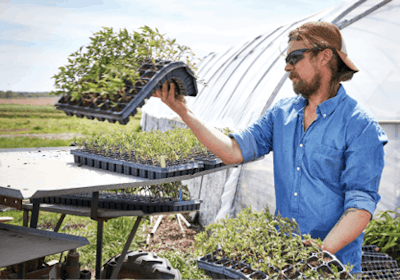
“We’re planting certain cover crops in certain pieces of land and saying, ‘You know what, we can’t really profit from that piece of the farm right now because the soil is poor and we need to restore it,’” Rachael explains. An on-staff horticulturist samples and analyzes soil, which then guides planting plans—all dependent on area-specific soil health as part of a seven-year restoration plan.
The Smedbergs view their work through the lens of creating a self-sustaining farm—from the soil to farm life itself. “We realized that if the mission is to improve the soil in the earth, then that must be what we do, and we can’t do that with a monocrop of hemp. We can’t do that without flowers and vegetables. Can’t do it without livestock in a small degree,” Jesse says.
“It’s important that …we look at the company through … the lens of a sustainable biome, and from that biome comes really incredible products,” he adds. “It allows us to really have a whole lot of control and a whole lot of our soul in the product, and it’s super rewarding that way.”
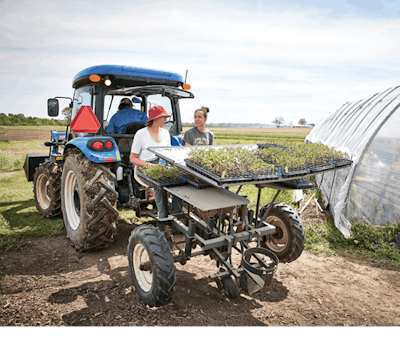
Building Community
Impacting and strengthening their local community has been a goal for the Smedbergs as they’ve navigated their early years farming full time. They found a sense of community and built upon it through their interactions with neighbors, customers and clients. In the process, they expose people to a new perspective on farm life as well as hemp.
“There’s obviously a false stigma around hemp and cannabis still, and we’re really bringing forth that bridge of education and breaking that stigma,” Rachael says.
Their daily market and farm stand also allows them to engage with clients directly. “We are able to have this dialogue that is so precious that so many other processors don’t get to have. And as a holistic and wellness farm, for us, that’s the reward. That’s everything,” Jesse says.
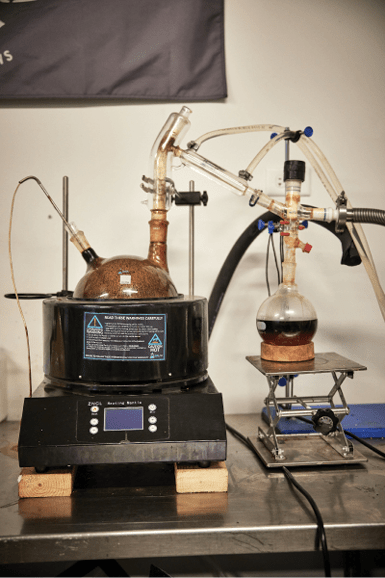
Rachael explains that the personal interaction is a constant springboard for product development: “We work with so many different clients that have so many specific ailments. We’re working with them face to face, so we’re actually developing products by having these conversations. We’re really seeing what the market wants by having these conversations.” Dandelion hemp salve, terpene-infused room sprays and numerous CBD formulations got started this way.
With their third year as full-time farmers now underway, they can look back on the hurdles they’ve overcome. Rachael cites rainy weather as their biggest learning curve as first-generation farmers. Jesse adds, “The learning curve is that you obsess about it and read about it as much as you want, but you’re still a greenhorn for the first few years.”
They feel fortunate that they’ve succeeded despite the COVID-19 pandemic and the mistakes they’ve made. “The biggest lesson that I’ve learned in the last year is that less is more, and nothing beats a diversity of profit centers,” Jesse says. He says the farm’s diversity of products and services has been crucial to its financial stability.
“We’ve been able to pivot into different areas efficiently because it’s part of our business plan,” he says. That diversity enabled them to react to the market, especially at the height of the pandemic, and move more quickly than they could had they been strictly growing or processing hemp.
Watching many hemp farmers go out of business because they “went all-in on hemp” is fresh in their minds. “Hemp and CBD still accounts for the vast majority of our income, but it accounts for a small portion of a sustainable biome. I think that’s important to note, that we look at this family farm and we say, ‘How will this work long term?’” Jesse says.
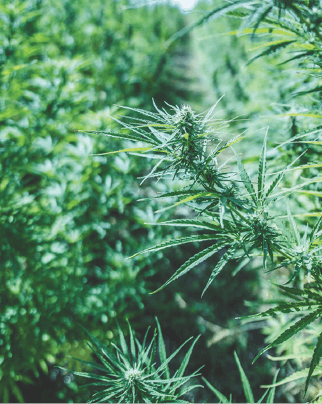
Looking Forward to a Bright, Branded Future
As the 2021 growing season kicks into high gear, education is a primary focus at Tulip Tree Gardens.
Numerous events are already on the calendar. On-farm outdoor children’s classes, dubbed “Re-Gen Kids,” promise to teach them to “nurture the soil” and “nourish the soul.” Some of the topics covered will include soil biome, vegetable planting, beneficial insects and worm farms.
Plans also call for opening the farm to teach about hemp, how it’s grown, and the many ways it contributes to wellness and farm life. Rachael is focused on the upcoming launch of an educational TTG YouTube channel to spread the word and expand the farm’s audience. Some other soon-to-be-announced projects are brewing, too.
For others considering growing hemp or farming full time, the Smedbergs offer this advice: Make sure you have a place to sell your crop before you grow it. Start small, so if you make mistakes, they’re small, too. And realize that farming is not an easy road.
“What we learned is this is a ton of hard work. It’s super rewarding, but you have to have grit,” Rachael says. “With us—with no experience in any of this—we’re incredibly successful. And we have a lot of grit. We work a lot of hours, but it’s so worth it.”
Jesse adds that branding your farm is essential to success: “Why did they brand ranches 100 years ago? Why did they brand these farms 100 years ago? They did it because you would have a reference to understand where something came from locally. People want that reference again, so let’s give them that reference. If you’re a farmer—I don’t care if you’re growing corn and soy—brand it.”
For Tulip Tree Gardens, the brand comes easy because the brand is the lifestyle the Smedbergs live. “We’re just trying to connect people back to the soil, their food, and their farmers again,” Rachael says. And at TTG, hemp helps those connections become realities.
















